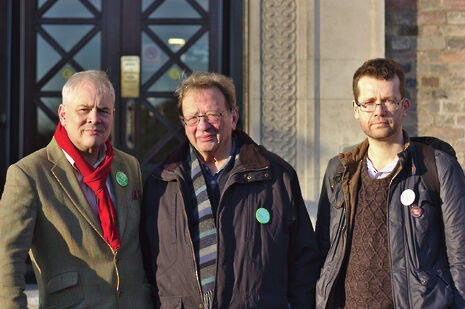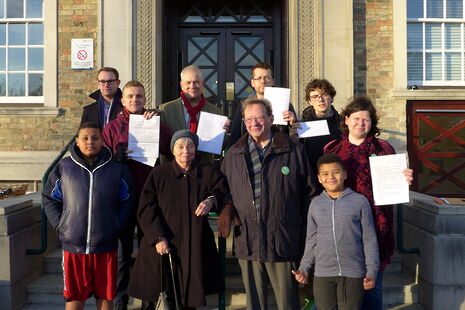Larry Sanders: ‘I think Bernard would have won’
The Green Party health spokesperson with a famous brother talks to Patrick Wernham about the recent election, free trade and identity politics

Larry Sanders is similar to his brother – the runner-up for the Democratic presidential nominee, Bernie, whom he insists on referring to as ‘Bernard’ throughout our interview – in a few respects. He certainly bears a noticeable physical resemblance, and shares many of his political views: in an interview with The Guardian earlier this year, Sanders said that his and Bernie’s politics were ‘99.9 per cent indivisible’.
Yet as I sit down with Sanders, what is most striking is the difference in how he chooses to engage with people. Whereas Bernie is rousing, angry, and even hectoring, Larry is much more circumspect. Throughout our time, Larry is nothing but thoughtful and good-natured.
Larry Sanders serves as the Green Party’s health spokesperson and stood as their parliamentary candidate in the recent Witney by-election, finishing fourth. It is in this capacity that Sanders is in Cambridge, and despite the focus of his talk to local Green Party members being on healthcare, he is happy to speak more generally about the state of the world.
Given that Larry shared much his brother’s analysis of the issues raised during the election, I start by asking, a little provocatively, whether he felt even the smallest bit of satisfaction about Hillary Clinton’s defeat.
Sanders refuses to rise to the bait: “Much more dissatisfaction because of what it means for the country, and for the world.”
“The crucial states were the ones in which Bernard had done quite well, and the voters who seem to have shifted are the people that Bernard was appealing to.”
He doesn't entirely rebut the premise of the question, however. “It was clear to me and I think to many people that Bernard would be a much stronger candidate, as well as a much better president.”
“The crucial states were the ones in which Bernard had done quite well, and the voters who seem to have shifted are the people that Bernard was appealing to. Those who lost jobs to stupid trade deals.”
This naturally leads onto the question of whether he thinks Bernie would have won, had he been the Democratic candidate. “I think Bernard would have won. He would have got the Democratic votes, and he would have had a higher proportion of young people, a higher proportion of white working class people, and a higher proportion of people who identity as independents.”
In much post-election analysis, there has been a focus on a particular group of voters in states like Michigan and Pennsylvania. Largely white, and previously Democrat supporters, they are seen to have suffered the most from economic decline and played a significant role in Trump’s victory. They are said to be, in a word, disenfranchised.
Does Sanders accept this analysis, and if so, does he believe the problem to be more economic or cultural in nature? “The first thing I want to say is that huge emphasis has been put on that [white working class vote], to some extent correctly, but the vast bulk of Trump vote was ordinary Republican voters, i.e. higher-than-average income.”
“I think it’s not necessarily possible to pull people apart in that way. If you feel that you’re doing pretty well then your grievances, your prejudices, are less significant to you. If you feel that everybody is turned on you, the government is turned on you, you’re having a really difficult time, you may well have lost your house, and all that sort of thing, then I think that a certain portion, not everybody, then find their anger is aroused against minorities.”
Following on from this analysis has often been the claim that the Democrats are losing touch with their more traditional voter base. It’s something that has also been said of the Labour Party in this country, and Sanders thinks the comparison between the parties is a valid one.
“I think they’re very similar. The basic underlying factor, and this is not a debating point, this is right there in the statistics, is that in the last 40 years, a large chunk of people of average income have not had their incomes go up. In many cases it’s gone down.”
Linked to this has been the criticism that the Left has focused too much on identity politics at the expense of the economic issues that matter more to the traditional vote. Bernie Sanders himself recently said that “It’s not good enough for someone to say, ‘I’m a woman! Vote for me!’” I ask Larry whether he thinks this is a fair charge.
“I know exactly who ‘this left’ is. The Green Party is not [too obsessed]. We have very specific economic, social, and environmental policies, and we certainly are in favour of equality for women, and racial equality, and so on, but I don’t think we’ve ever downplayed the rest of it.”
As a candidate and spokesman, Sanders is understandably keen to talk about the Green Party. Given the challenges to more centre-left parties at the moment, I ask if the Greens are the people able to provide the solution.
“All you need to do is go back to the places in America, or the north of England, that had their factories closed down ten, twenty, thirty, forty years ago and see what’s happened to the communities there.”
Sanders stresses how the Greens are sensitive to economic woes. “We’ve been aware of what trade policies do. This theory that free trade is a good thing: first of all it’s very rarely free because everyone who’s got power weighs in and does what’s good for them. The theory goes back two or three hundred years, and it’s a lovely theory, but it’s not true. All you need to do is go back to the places in America, or the north of England, that had their factories closed down 10, 20, 30, 40 years ago and see what’s happened to the communities there.”
“These considerations have been part of Green Party policy for a long time. In our last manifesto we had provision for expending a tremendous amount of money to transfer our energy system. Everybody knows we have to get renewable. We could do it now, save a lot of grief and a lot of money, and employ hundreds of thousands of people.”
The problems that Sanders raises are undeniable, and it’s also clear that the solutions put forward by the likes of him and his brother have broad appeal. Moreover, Sanders puts it across in such a gentle and well-meaning way that it is hard to disagree with him. In closing, I put it to him that it’s rather depressing that the mantle of progressive politics had to be taken up by his brother and Jeremy Corbyn, two old white men. A smile comes across Sanders’s face.
“I’m a great fan of diversity, but amongst that diversity old white guys are alright too”

 News / Uni Scout and Guide Club affirms trans inclusion 12 December 2025
News / Uni Scout and Guide Club affirms trans inclusion 12 December 2025 News / Cambridge Vet School gets lifeline year to stay accredited28 November 2025
News / Cambridge Vet School gets lifeline year to stay accredited28 November 2025 Science / Did your ex trip on King’s Parade? The science behind the ‘ick’12 December 2025
Science / Did your ex trip on King’s Parade? The science behind the ‘ick’12 December 2025 News / Cambridge study finds students learn better with notes than AI13 December 2025
News / Cambridge study finds students learn better with notes than AI13 December 2025 News / Pembroke to convert listed office building into accom9 December 2025
News / Pembroke to convert listed office building into accom9 December 2025







